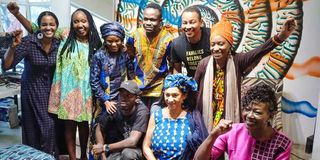The rise and rise of African feminists’ movements

Participants of a feminist dialogue hosted by African Ecofeminist Collective in Nairobi on June 26, 2022.
What you need to know:
- Activists in Africa are increasingly re-strategizing to speed up their cause of safeguarding the rights of women and girls.
- In 2019, at the height of the push for BBI, gender equality advocates solidified their voice under the Common Women Agenda.
- Last March, activists from more than 100 African civil society organisations, converged to discuss the land injustices facing the African woman.
With the global wave to accelerate realisation of gender equality under the UN Women-led Generation Equality campaign, activists in Africa are increasingly re-strategizing to speed up their cause of safeguarding the rights of women and girls.
In the past three years, advocates in the African continent have formed theme-focused networks, campaigns and initiatives to amplify their voices and get the attention of the government and policymakers.
And Kenya seems to be the focal ground.
Equality advocates
In 2019, at the height of the push for Building Bridges Initiative (BBI), a drive to change the Constitution of Kenya, gender equality advocates from private, civil society and public sector, women political leaders, and academia solidified their voice under the Common Women Agenda (Cowa).
Cowa came up with a raft of recommendations, later submitted to the BBI Secretariat.
In a November 2020 interview, then Gender Cabinet Secretary Prof Margaret Kobia had expressed her joy that the recommendations had been integrated into BBI.
Stand for Her Land
“For instance, we proposed an increase of resources to counties and election of a man and a woman to Senate, that has happened,” she said.
Last March, activists from more than 100 civil society organisations across Kenya, Uganda, Senegal, Tanzania, and Ethiopia, converged in Nairobi to discuss the land injustices facing the African woman.
To tackle this problem, they collectively launched Stand for Her Land in Africa initiative, a campaign to advocate women’s land rights on the continent.
According to its proponents, the initiative is meant to bridge the “gap between government commitments and the reality on the ground.”
The initiative’s global advocacy director Esther Mwaura Muiru had said: “When women don’t own the land they live and work on, they become trapped in patriarchal systems that reinforce gender inequalities.”
Family Law Network
Last week, women and girls’ rights advocates from 20 African countries also met in Nairobi for a three-day conference.
They shared possible strategies for speeding up an end to child marriage, female genital mutilation, and disinheritance, among other forms of violence against women and girls.
At the end, they resolved to establish Africa Family Law Network to push their agenda of calling for a review of respective laws to remove the retrogressive sections and oversight on the implementation of the same.
Equality Now senior legal advisor Esther Waweru, said already they had a sustainability plan, ensuring that the network’s work is uninterrupted due to a lack of resources.
“We have already engaged our development partners to support the network and all (the civil societies) involved have committed to setting aside resources for this cause,” she said.





